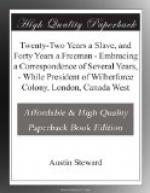One sabbath afternoon, one of my children was sitting in the door, when a tall, emaciated Indian came up and said, “Will my little lady please to give me a drink of water?” While she went for it, I invited him to a seat within. There was something dignified and commanding in his appearance, and something in his voice and countenance, that won my confidence and respect at once. He remained in the place some time, and I learned his history.
In his younger days he had been a great warrior; and even now, when recounting, as he often did, the scenes of the battle field, his eye would burn with savage fire, lighting up his whole countenance with the fiercest kind of bravery, and often with a hideous yell that would startle our very souls, he would burst from the room and bound over the fields and forest, with the fleetness of a deer—making the woods ring with his frightful war-cry, until the blood seemed ready to curdle in our veins. He had also been one of the famous Tecumseh’s braves; and had stood by him when he fell on the fifth of October, 1813. This old brave, whenever he called the name of Tecumseh, bowed his head reverently; and would often try to tell us how very deeply they mourned when it could no longer be doubted that the brave heart of Tecumseh, brother of the celebrated Wabash prophet, had ceased to beat.
“Had an arrow pierced the sun and brought it to my feet,” said the old warrior, “I could not have been more astounded than at the fall of Tecumseh.” Then he told us that once, after a great and victorious battle, Tecumseh, in his war paint and feathers, stood in the midst of his braves, when a little pale faced girl made her way weeping to him and said, “My mother is very ill, and your men are abusing her, and refuse to go away.” “Never,” said the Indian, “did I see a frown so terrible on the face of Tecumseh, as at that moment; when he with one hand clutched his tomahawk, and with the other led the little girl to the scene of riot. He approached the unruly savages with uplifted tomahawk, its edge glittering like silver, and with one shout of ‘begone!’ they scattered as though a thunderbolt had fallen in their midst.”
But the old warrior at Wilberforce fought no more battles, except in imagination those of the past. After peace was declared he bought a valuable piece of land, with the intention of spending the remainder of his life more quietly; but unfortunately there lived not far from him a man who had once been the possessor of that farm, and had lost it in some way, and was now in reduced circumstances.
He was both envious and vicious; and because he could not himself buy the land, he was determined that the old Indian should not have it. After having tried many ways to get it from him, he finally complained of him, for fighting for the British and against the country where he now resided. This was successful; he was arrested and thrown into prison, and without a trial, removed from one prison to another, until




